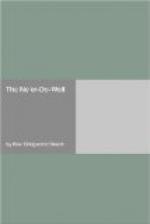She was still sitting there at a late hour when she heard the outside door close and Cortlandt’s footsteps mounting the stairs. She was glad he had his own room and never entered hers at such an hour, for even to talk with him in her present state of mind and body would have been more than she could bear.
She was unreasonably annoyed, therefore, when he came boldly into her chamber without even knocking, for all the world like a welcome lover. To conceal her irritation, she kept her face turned from him and continued fanning herself listlessly. She was reclining in a wicker chair, lightly clad in a filmy silk negligee, which she mechanically drew closer.
“Rather late for good-nights,” she said, coldly.
“I’ve just come from Anthony’s supper-party.”
His voice made her look round sharply. She saw that his linen, ordinarily stiff and immaculate, was sodden and crumpled, his collar limp, his forehead glistening with drops of moisture. She could not remember ever having seen him in such a state. His appearance affected her queerly. In him this dishevelment was shocking.
“What ails you, Stephen?” she cried. “Have you been drinking?”
“No. I didn’t drink much. I brought you something.”
He took the loving-cup from its flannel bag and set it upon the table. “They gave me this.”
“It is very pretty, though I don’t care for such things.”
“And this too.” He tossed the watch with its enamelled monogram into her lap.
“Ah! That’s very handsome.”
“Yes, I thought you’d like it; it’s from Anthony.” He laughed, then shuddered, as though a cold wind had bitten through his sodden garments.
“Why—you seem excited over these souvenirs. You surely expected—”
He broke in—a thing he rarely did while she was speaking:
“Anthony made a speech when he gave it to me—a very nice speech, full of friendship and love and gratitude.” He repeated Kirk’s words as he remembered them, “What do you think of that?”
“I think he expressed himself very frankly. But why do you tell me now, when the morning will do just as well? I’m prostrated with this heat.”
“He actually acknowledged his debt in public.”
Mrs. Cortlandt’s eyes widened. This was not the man she knew. At this moment he was actually insistent, almost overbearing, and he was regarding her with that same ironical sneer that had roused her anger earlier in the evening.
“Well, come to the point,” she cried, irritably. “I don’t understand what you are getting at. If you didn’t wish to accept anything from him, why did you go?”
He began to chuckle, apparently without reason. His shoulders shook, feebly at first, then more violently; his flat chest heaved, and he hiccoughed as if from physical weakness. It was alarming, and she rose, staring at him affrightedly. The sight of her increased his mirthless laughter. He continued to shudder and shake in uncontrollable hysteria, but his eyes were bright and watchful.




